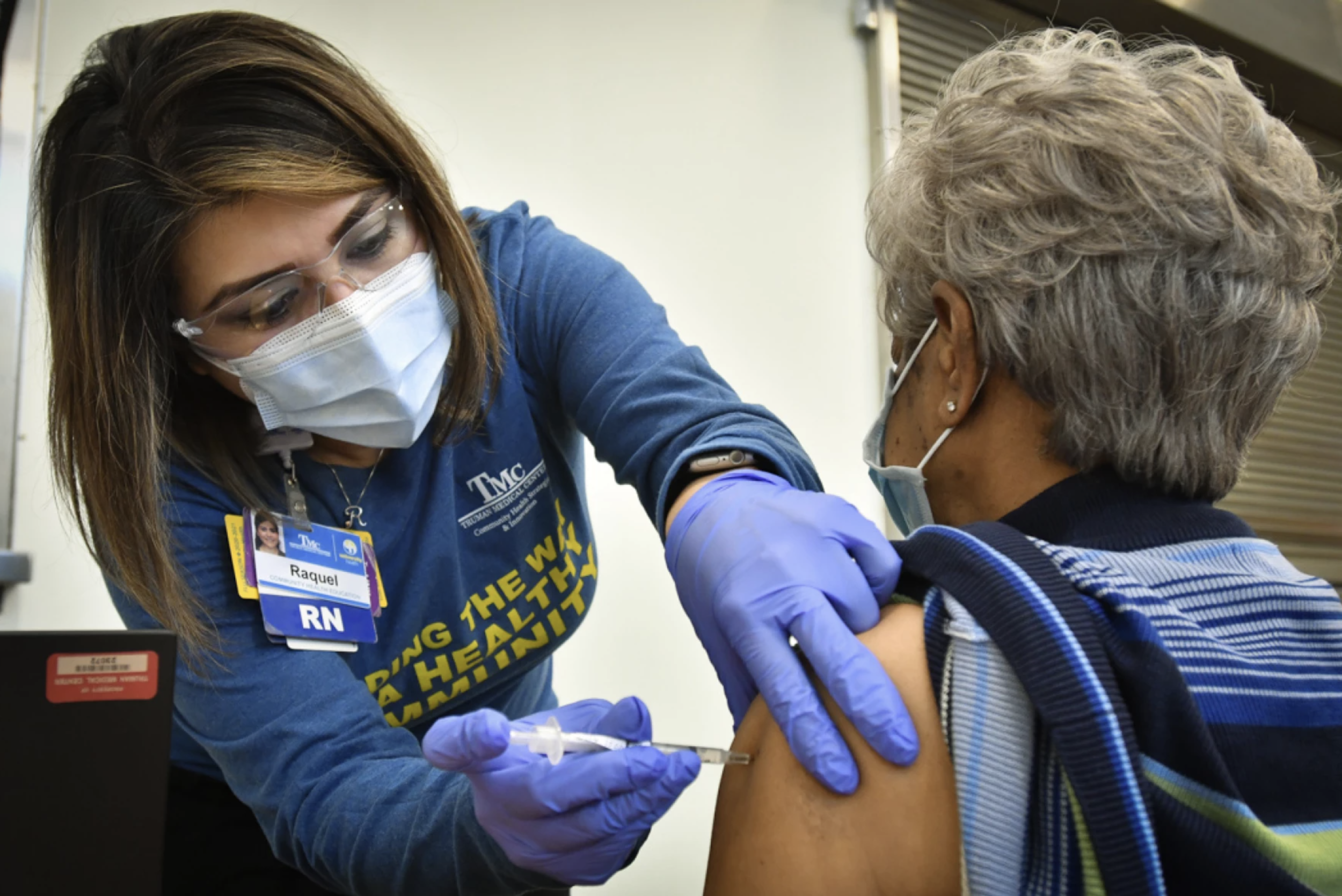Vaccines and how to beat Covid: 'The answer is in us'
So many people were coming into the Black Kansas City churches to get Covid-19 vaccinations that messengers sent for television stations.
You see? Jim Nunnelly, a self-described impatient man, brings up the recent vaccination efforts between Morning Star Missionary Baptist Church and St. James United Methodist Church with Truman Medical Centers to show that his community is likewise urgently determined to beat back the pandemic.
“There is this incorrect thinking that our community is powerless,” Nunnelly said.
In those churches, seeing the pastors working their connections and their clergy’s wide influence, Nunnelly saw the same drive that has propelled his work of connecting people who want the Covid vaccinations to the health agencies that have them.
Truman Medical Center registered nurse Raquel Garcia administers a Covid-19 vaccine to 80-year-old Virginia Davis at Morning Star Missionary Baptist Church Jan. 25. Photo for KCUR 89.3 by Carlos Moreno.
“The answer is in us,” he said. “We have assumed Black people don’t know anything — don’t want to do anything . . . and that is so untrue. There is great capacity in our community. Great capacity.”
The work Nunnelly does, through his popular Facebook page and a constant regimen of phone calls, is overwhelmed just getting people who want the vaccine connected to providers. He’s not arguing against those who don’t trust the vaccines. He said he understands the history of neglect and abuse of Black communities that can fuel doubt for some.
Just watch what he does to make his case for vaccines. And why.
Nunnelly is a retired public health administrator with five decades in the field, including being the original chief operating officer of the Samuel U. Rodgers Health Clinic in Kansas City.
While earning his master’s degree in public health at the University of Michigan in Ann Arbor, he served a three-month rotation at the Centers for Disease Control in Atlanta and saw close-hand the CDC’s relentless pursuit of a global understanding of health threats, including pandemics.
So when he chases after vaccination opportunities for others, he does so with conviction.
“When these people (the CDC) speak in favor of this vaccine, knowing my relationship with public health, and knowing their expertise — which is tremendous — I’m a little more advanced in moving the needle along,” he said. “I’m assured this is the right thing to do.”
He rushes to make the connections to vaccination opportunities because he feels we are in a race against Covid-19’s isolating despair. Mental health is deteriorating and where communities doubt the vaccines or feel they are beyond their reach, they lose the light that can help see them out.
“Hopelessness kills more people than Covid will,” he said.
But it doesn’t have to be that way.
“One of the reasons I push so hard for the Covid vaccination,” he said, “is that we can do something about this.”
The state has set up a survey for Missourians to get in line and get notified about vaccination opportunities as the state works through a tiered system of prioritizing those residents who are most vulnerable physically and those whose jobs are essential or put them more at risk.
Residents can sign up as well on the Jackson County site and the Kansas City Health Department site. And Kansas City residents who can’t get online can call 3-1-1 to get signed in. See other area county sites here.
People who are under the care of health systems or clinics can also check with their health care providers for vaccination opportunities.
Nunnelly, who was also the founding director of Jackson County’s COMBAT anti crime and drug program in 1989, values partnerships and strengthening communities by using the building blocks already in place. It’s a model he championed as one of the early architects of LINC’s community programs.
And the work against Covid should follow the same course, he said, matching people in need with the resources in their communities and helping them do their work better.
Those are the kind of calls Nunnelly is making in aid of others, many of them listeners to his weekly radio show on KPRT 1590 AM and 106.1 FM, Plain Talk About Diabetes, Mondays at 1 p.m.
“I just don’t want to see people die needlessly,” he said. “I’ve lived long enough to see a lot of people die . . . I’ve seen polio as a child. I’ve seen flu epidemics. I’ve seen diabetes run rapidly through our community.”
“Am I vocal? Yes. Am I impatient? Yes.”
By Joe Robertson/LINC Writer

